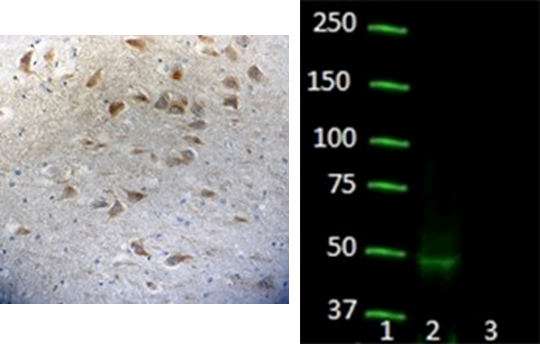 |
| Parkinson’s disease (PD) is one of the most well-known neurodegenerative disorders among the 600+ disorders afflicting the nervous system. Progressive loss of dopaminergic neurons (DAs) in the substantia nigra is a contributing factor in the development of PD. A recent study by Lee et al, has demonstrated that PINK1 and Parkin, two proteins commonly mutated in PD, work collaboratively to regulate the steady-state levels of PARIS to ensure DA neuron survival. Inactivation of PINK1 or Parkin was shown to lead to improper clearance of PARIS, DA neuron loss and neurodegeneration. Learn more about the reagents BioLegend offers to study these integral PD-associated pathways. |
 |
 |
| Purified anti-PINK1 Antibody |
Purified anti-PARIS (ZNF746) Antibody |
 |
 |
| (Left) IHC staining of clone DU46-1.1 on formalin-fixed paraffin-embedded Parkinson’s disease brain tissue. (Right) Western blot of clone DU46-1.1. Lane 1: Molecular weight marker; Lane 2: PINK1 transfected 293T cell lysate; Lane 3: Control 293T cell lysate. | Staining of Clone N196/16 on formalin-fixed paraffin-embedded human placenta tissue. |
 |
| Description | Clone | Reactivity | Applications |
|---|---|---|---|
| Purified anti-PARIS (ZNF746) Antibody | N196/16 | Human, Mouse, Rat | WB, IHC |
| Purified anti-Parkin Antibody | Prk 109 | Human, Mouse | ELISA, WB, IHC |
| Purified anti-Parkin Antibody | Prk 8 | Human, Mouse | ELISA, WB, IHC |
| Purified anti-PINK1 Antibody | N4/15 | Human, Mouse, Rat | WB |
| Purified anti-PINK1 Antibody | DU46-1.1 | Human | ELISA, WB, IHC, IP |
 |
| ELISA kit LEGEND MAX™ Human α-Synuclein ELISA Kit with Pre-coated Plate Antibodies for PD-Related Proteins α-Synuclein, aggregated α-Synuclein, 34-45 LRRK2 DJ-1 (PARK7) |
*Any references to promotions on this page may not be valid at this time. View our promotions page for the most up-to-date promotions.
 Login / Register
Login / Register 






Follow Us